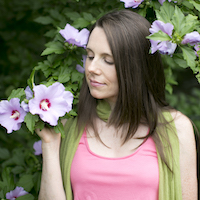There are moments when I’ve felt like I’m going to break open—and not in the good sort of way.
In those moments, I actually feel like I’m going to explode and lose my center—the me that I know myself to be. And then, I have moments that feel so connected that I just might burst inside from a bliss-filled kind of spontaneous combustion that seems to come from some unseen place.
It feels so amazing to be so present with myself in those moments, I’m suddenly scared I’ll lose it. And then, there are moments where I’m in a void: I feel disconnected, disoriented, and not so my “Self” as I want to be.
All of these moments are so different—and yet, identical. They hold something sacred, simple, and human in common—a definable state of being.
The self-help movement has talked about self-love like it’s something we have to work at attaining—like it’s this star in the sky we can get to, if only we do this set of affirmations and daily rituals to start our day with that special, trademarked technique to open our hearts and clear our minds of clutter and our bodies of toxins.
There’s books upon books telling you to “eat this,” and “exercise that way,” and “get this much sleep,” and “think grateful thoughts about yourself and others,” and “be kind to yourself when you look in the mirror and attract positive relationships”—the list goes on and on.
It makes me anxious just to write it; it makes me anxious, because that’s not really self-love.
Self-love,
as if it’s a cloud floating in the distance that is
ungraspable and perhaps even
unreal.
Self-love,
that ideal lover that we will never meet
in this lifetime,
or so it seems.
In my journey into self-love, I wrote about embracing my “Self” as my soulmate. I wrote about letting go of that desire that another could or would complete me, or offer me something I could not offer to myself.
But, there was something missing in that expression of my innermost heart: the deeper and more mysterious aspect of what it is to truly and honestly embrace self.
Love is a big, juicy, soft, mushy, rather expansive word for acceptance.
Today, I found this quote by Thich Nhat Hanh, and it spoke to me so much that it inspired this piece: “You must love in such a way that the person you love feels free.”
And, ultimately, the only person you need to love—or at least, love first and foremost—is you!
I’m going to substitute love for acceptance for a bit, and see what flows.
What if we accept those moments of bliss, just as much as those moments of void, depletion, and darkness?
What if that acceptance allows for space? Space to just be you. And, what if “you” is not perfect or constantly centered and balanced? What if “you” is up, just as much “you” is down?
What if “you” is tired, just as much as “you” is energized?
What if “you” is doubting and fearful, as much as “you” are trusting and open?
I feel like a huge weight is lifted off of my heart, body, and mind when I accept where I’m at—when I offer myself the freedom to just be. And, I’m finding that the more I do this, the more acceptance I have for others and their messy, wild, and wonderful moments.
The more I accept (that is, love), the more I actually find a sense of balance in the ebbs and flows of my life—both internal and external.
So, my reader friend, I think that self-love might just be about self-acceptance. I think that it’s okay to accept my mad self, who gets really agitated when drivers cut her off or tail her, instead of telling myself to change my attitude as soon as that anger bubbles up.
When I accept, I question things. I acknowledge: “I’m really pissed that this person just cut me off right now, and I feel like giving them the finger.” I feel the boiling rage rising to the surface—and I love it. I breathe into it. I give it freedom to rise.
And, as it rises, breathes, and expresses itself in my body and thoughts, something in me says: “What is the origin of this rage? Did this person really cause it or is it coming from that deep down place? Was this person actually a blessing, offering a release of something really old and really hidden?”
I accept, and in that acceptance, I feel. I feel the the myriad of colorful feelings that flow through me and make me the human being that I am.
I question, and something shifts.
And now, when I drive, I know it’s a meditation—because somehow, those anonymous drivers have had the power to stir me up inside. And in that stirring, my Self is given the opportunity to accept all that arises. Acceptance (love) is a blessing.
We accept, and we allow our whole selves to breathe freely and openly—and without judgment.
Now, I can love what I once viewed as mistakes. I can love (and accept) that I once thought self-love meant total kindness toward myself, in my thoughts, feelings, and actions. And, in that space of seeking a love that was unattainable—an inner sainthood—I have found that my “right and wrong,” “black and white” thinking was okay.
I found my divine lover and ultimate accept-or (I think I may have made that word up) in the space of me being me. And, the me and you that are being are simply doing just that. We are experiencing and expressing what the moment is presenting us, within our minds, bodies, and hearts—and in the outside world experience.
Self is not perfect. I don’t know who made up this ideal image of Self in the first place. The Buddha, Jesus, and all prophets or saints we deem in our memories to be the sacred versions of the human being, were perfectly imperfect too.
We often idealize people in our memories. My sister, who left this planet 16 years ago, is remembered by many (including me) for her light-filled, thespian spirit. But she also had a dark side—like me, you, and every human being on this planet.
My sister got angry and acted impulsive at times. She lashed out physically. She screamed and she raged. There was a time my sister, Rebecca (probably as an early teenager), got so mad at me for something I said, she threw a marble at me, and it hit my eye—causing my first and only black eye.
But, when I look at her picture, sitting on a table with the word “love” hanging above it, I don’t think of that black eye; I think of her spirit—sweet, soulful, kind, and youthful. When I look at her picture today, I feel only love. It’s more pleasant for us to remember the light. We tend to prefer the light, the positive, the pleasant.
What I’m opening up to is simply experiencing—accepting it all. And, in that place, I am falling more deeply in love with who I am as a human being. And, as I fall more deeply in love with all that I am—darkness and light—I love all humans more deeply.
My new mantra: I embrace it all.
My favorite self “love” mantra: I accept myself completely.
This includes the light, dark, and everything in between. When I feel grumpy late in the day, because I didn’t sleep well the night before, instead of beating myself up with my thoughts or wanting to force myself into a positive mindset with a meditation, yoga, or some other mood-changing practice, I just acknowledge it.
“I’m grumpy right now,” my thoughts say, as I observe my mood. I know it won’t last. I know I have a choice: I could rest, eat something (if it’s due to low blood sugar), take personal space (if I’m with my daughter), and realize I’m losing my patience a bit. Most importantly, I just let it be.
Sometimes, the desire to take action comes from that place of escape—that light-filled self wanting to climb out of the shadow world. But, darkness has much to teach us about ourselves. Darkness is just as much a part of being human as is our light.
Acceptance isn’t easy; it’s a practice. Practice is a life-long “project.” As someone who has jumped on the “acceptance practice” wagon, I can tell you that something begins to shift when we go there. A courage to explore new and vulnerable terrain emerges.
And, with its gentle, caressing presence, it teaches us that we already have it—that love that we seek for ourselves. A magic occurs when we see it.
We then realize we have the potential to experience life with such depth and richness, from a vantage point that has been there to access all along. And, when we see it, those bruises become a salve for the runaway child who had been waiting for you to just stop and see her without judgement.
Suddenly, you are able to say: I see all of myself, and while I may not like all of what I see, I accept it. I love it. What I see is the totality of my being. What I see is sacred.
~
Author: Sarah Lamb
Image: Flickr/Courtney Emery
Editor: Yoli Ramazzina
Copy editor: Travis May
Social editor: Travis May
 Share on bsky
Share on bsky






Read 0 comments and reply